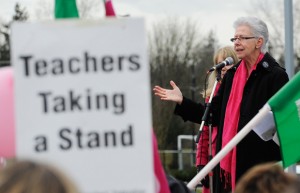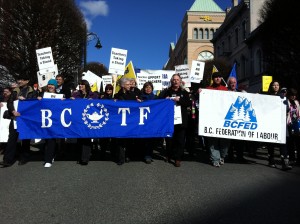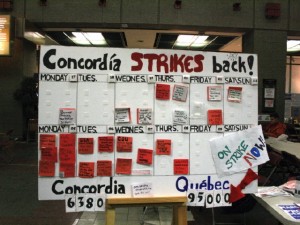For two solid days in dozens of cities and towns across British Columbia, tens of thousands of students, parents, faculty members, peer unions, and the BC Federation of Labour turned out in support of the BCTF and teachers. For the rally in Victoria yesterday, the President of the Canadian Federation of teachers flew across the country to be there, as did peer teaching union presidents and representatives from as far as Nova Scotia. This is bigger than the BCTF BC Fed President Jim Sinclair announced over the last two days. For the BC Fed and everyone showing their solidarity, this is about standing up for the province, for what is right and just, for rights, for workers, for people young and old struggling from day to day as citizens. This is about democratic rule and the BCTF and BC Fed are in this for the long haul. BCTF President Susan Lambert rallied today in Vancouver, promising the BC Liberals’ as they move on oppressive, debilitating legislation, that this governing party’s chance of re-election is that of a “proverbial snowflake, hellbound!”

BCTF President Lambert Speaks out at Vancouver Rally
That’s powerful and resonates with the vast system of public support that is turning out for the rallies across the province. To try and govern workers– to try and suppress a labour movement that is ascendent and increasingly unified– with this might of legislation, Bill 22, is foolish. The opposition party, the NDP in BC, is doing all it can to undermine and debate this anti-democratic legislation that is Bill 22. Adrian Dix, Leader of the NDP, guaranteed the labour movement yesterday in Victoria that his party was not resting and would do everything in its power to give teachers the fair right to bargain– a right that every public or private sector union or professional association deserves.

 Follow
Follow



Net Zero Workers
There is a long history of wage freezes for workers that amount to wage cuts against rapidly rising costs of living. There was a time when governments were interested in supporting unions defending wages as a base for fair compensation for the work and a wage increase to maintain a decent standard of living against rising costs. In bad times, unions and employers could give and in depressions the unemployed ranks grow, families collapse, and businesses fold. Currently, governments are finessing to have it both ways. A psychology of governing parties is to assure consumers and investors that the economy is always looking up while convincing workers that the coffers are empty and the economy is recessing. While Athens burns business analysts comment daily that the markets are gaining lost ground. ‘Economic growth is on the horizon while we are pressed to freeze wages and put our fiscal house in order.’ Mixed messages for the consumer as worker, now the net zero worker.
“Net zero,” newspeak for wage freeze, was introduced as a mantra in about 2002 and repeated by the Public Sector Employers’ Council (PSEC) in British Columbia from 2008 to this current point. In 2010 the “net zero mandate” was reinforced in BC government or PSEC policy. Public sector workers were again net zero workers. The BCTF rallied hard against this and are standing up again to pool together all unions, as the governing party in BC again designated teachers as net zero workers. Let them bargain, let them mediate, Minister of Education George Abbott insisted in legislative debate on 12 March, as long as “all of that is within the context of net zero.”
Thirty years ago, top executive salaries were about 15 times that of the average worker’s. Now, those executive salaries are 75 times that of the worker’s. It’s increasingly difficult to accept one’s fate as a net zero worker in the face of skyrocketing executive salaries and lawless mismanagement. Of course, things might change should the net zero worker threaten to become a net zero consumer. Net zero spending was once called a boycott.
10 Comments
Posted in BC Education, Commentary, Employment rights, Government, Politics, Solidarity, Strikes & Labor Disputes, Unions, Working conditions
Tagged Economic Trends, Government, Working conditions